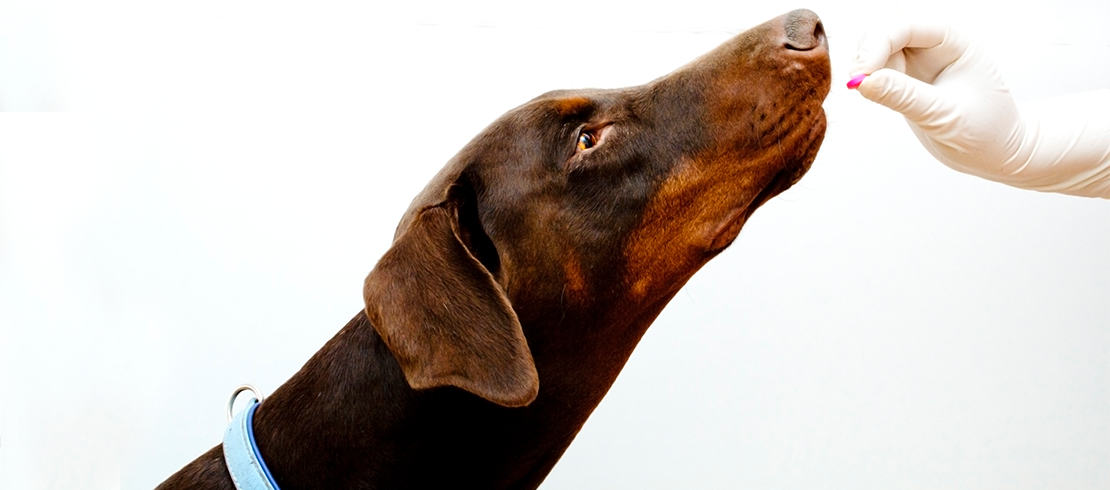One of the most important first steps in a puppy’s life is being wormed. Intestinal worms are one of the most common causes of sickness in puppies, so it’s vital to treat them for worms as soon as you welcome your bundle of fluff into their new home. Depending on your pup’s age and the type of worm you want to protect them against, there are a variety of different treatments you can use. But it’s essential dog owners have all the facts to keep pups healthy.
Here’s your need-to-know guide to worming puppies.
Why is worming important?
Intestinal worms in puppies can make them sick, tired and reduce the absorption of much-needed nutrients and vitamins. This can lead to blood loss and anaemia, which has the potential to be very serious in the early stages of your puppy’s young life. That’s why it’s so important to worm your puppy as soon as you can (usually from the age of two weeks)1.
How do puppies get worms?
Puppies are more susceptible to worms than adult dogs because of their young immune systems. Puppies can even be born with worms passed on by their mother or they can pick them up through their mother’s milk during nursing.
Other dogs can pass worms to pups too, and infected fleas can carry the tapeworm, which will infect a puppy if ingested.
What common types of worms are puppies at risk of?
In the UK, your puppy isn’t just exposed to one type of worm, in fact there are four common types of intestinal worms you need to be aware of:
Roundworms
Roundworms are the worms most commonly found in dogs, particularly puppies. There are two types of roundworm; Toxocara canis and Toxascaris leonina Roundworm larvae initially infect the intestinal tract but as the Toxocara canis larvae mature they move onto the lungs where they will develop and eventually target the airways. Once they’re coughed up and swallowed, they re-enter the intestine and their lifecycle is complete2. The lifecycle of the Toxascaris leonina larvae is much simpler, and they will stay put in the intestinal tract.
These parasites have the appearance of long, thin spaghetti, and often grow to around 12 cm.
Puppies can contract them through infected faeces or contaminated soil. Roundworms can even infect humans and children, so by worming your dog, you’re protecting the whole family.
Hookworms
Hookworms look very different from roundworms and tapeworms – they’re short, have teeth and feed on your puppy’s (or dog’s) blood. They can be a dangerous intestinal parasite and can even be fatal to puppies because they suck large amounts of nutrients from their host.
Puppies can contract hookworm from their mother during suckling.
Although hookworms are less common in the UK than roundworms and tapeworms, they exist in Europe and can pose a risk to pups.
Tapeworms
Tapeworms are more commonly found in adult dogs than puppies. Infected fleas spread the parasite when a puppy or dog accidentally eats them, so it’s important to use a flea preventative treatment as soon as your puppy starts venturing outside.
Tapeworms can grow up to 16ft inside an adult dog! But when excreted, the worm splits into shapes that look like tiny grains of rice.
These worms absorb nutrients as they’re being digested in the small intestine but it often doesn’t harm the pet in the early stages which means it’s often difficult to detect a tapeworm infection.
Whipworms
Less common in the UK than abroad, whipworms live in the large intestine and pose the greatest harm if they burrow into a pup’s intestinal tissue.
What are the signs of worms in puppies?
Worms can cause unpleasant and uncomfortable symptoms, and, in extreme cases, even death. But not all infected puppies and dogs will show any obvious signs of having worms, which is why regular treatment is especially important.
In cases when dogs are showing signs, worms can cause:
- weakness and listlessness
- loss of appetite
- weight loss despite an increased appetite
- diarrhoea or vomiting
- abnormally swollen belly
- dry coat
- scooting (when your puppy rubs their bottom on the floor)
- licking their rear
- coughing (in the case of roundworm, Toxocara canis, which may be living in your puppy’s lungs)
- signs of infection in your puppies faeces, such as spaghetti-like worms, rice-like grains, mucus or blood
How do I get rid of worms in my puppy?
Although worms are a nasty business, if your puppy or dog has worms, they’re fairly easy to treat.
The best defence is regular treatment against worms in both puppies and dogs.

When and how often should I worm my puppy?
As mentioned above, most puppies are born with worms and they acquire more from their mother’s milk. Because of this it’s important they’re treated every two weeks from two to 12 weeks of age.
Puppies of three to six months of age should be treated for worms monthly, then at least once every three months for the rest of their life.
Should I treat my pregnant or nursing dog for worms?
It’s recommended adult dogs are wormed at least four times a year and it’s also important during pregnancy to help reduce the likelihood of passing them onto their litter.
Pregnant bitches should be wormed in the last third of their pregnancy (always follow product instructions carefully) and nursing bitches should be wormed when her puppies are two weeks old and again every fortnight until the pups are 12 weeks old. This will help reduce the risk of the puppies becoming infected through their mother’s milk.
After this, the mother should be wormed at least every three-months.
Some dogs may need worming more often than others, depending on their lifestyle, for example, farm dogs may need to be wormed more frequently than household dogs.
It’s important to note that not all worming products are suitable to use on pregnant bitches, so speak to your vet for advice.

What should I expect after worming my puppy?
Different worming products act in different ways, so your experience will vary.
Some products paralyse and kill worms, which means in the first few days after worming your furry baby, you might notice worms in their faeces. But don’t worry, these are dead worms being expelled by the body.
What are the side effects of worming puppies?
As with all medication, side effects may occur. Puppies with a particularly high worm infestation may vomit up dead worms.
Always speak to your vet if you are concerned about any reactions your dog is having following treatment, such as diarrhoea or sickness.
What about lungworm?
Perhaps the nastiest of all the worms your puppy could catch is lungworm, which can cause serious health problems and even death. Lungworm is spreading in the UK. Dogs catch it from eating slugs and snails, and potentially even from their slime, which means your puppy’s risk is low until they venture outside.
Lungworm isn’t an intestinal worm, like those above, instead once the parasite is ingested it moves through the body to the puppy or dog’s heart and blood vessels of the lung.
How do I protect my puppy from lungworm?
The best way to protect your puppy from lungworm is through a regular prevention programme. This is particularly important if lungworm has been reported in your area.
Check your location using our online lungworm locator.
Make sure you speak to your vet because not all worming products are effective against lungworm. Unlike many other worming products that only need to be given once every three months, it’s important to treat your dog for lungworm every month. Not doing so leaves them unprotected for too long between doses.
How does flea treatment help prevent worms?
Fleas can carry the tapeworm parasite, which is passed on when puppies ingest a flea. This can happen quite easily if a puppy (or dog) accidentally swallows a flea when grooming and licking themselves, or coming into contact with other infested dogs or wildlife.
It’s important to help protect your puppy against fleas as soon as they start venturing into the great outdoors. Not only is there a worm risk, but a particularly heavy infestation of these blood-sucking fleas can lead to anaemia in puppies.
Alongside a regular worming treatment, you’ll need to use an effective flea preventative regularly to help keep them flea-free. Check with your vet which flea preventatives are most suitable for your pup.
Did you know...?
Chimpanzees are thought to swallow rough and spiky leaves in order to remove worms from their intestines. Luckily, there are easier ways to control them in your dog.
Speak to your vet to find out more about suitable worming treatments.
References:
1. https://www.dogstrust.ie/help-advice/dog-behaviour-health/worms-ticks-and-fleas
2. https://www.bluecross.org.uk/pet-advice/intestinal-worms-dogs
